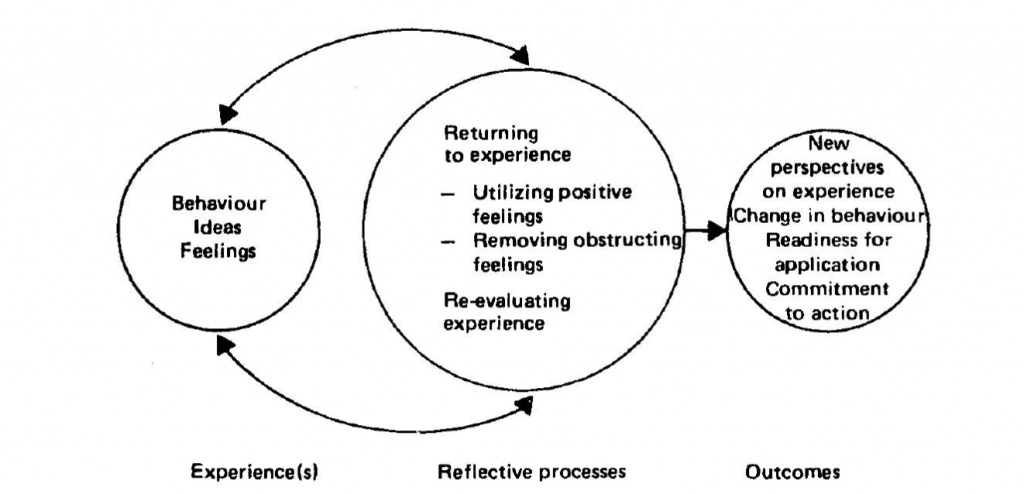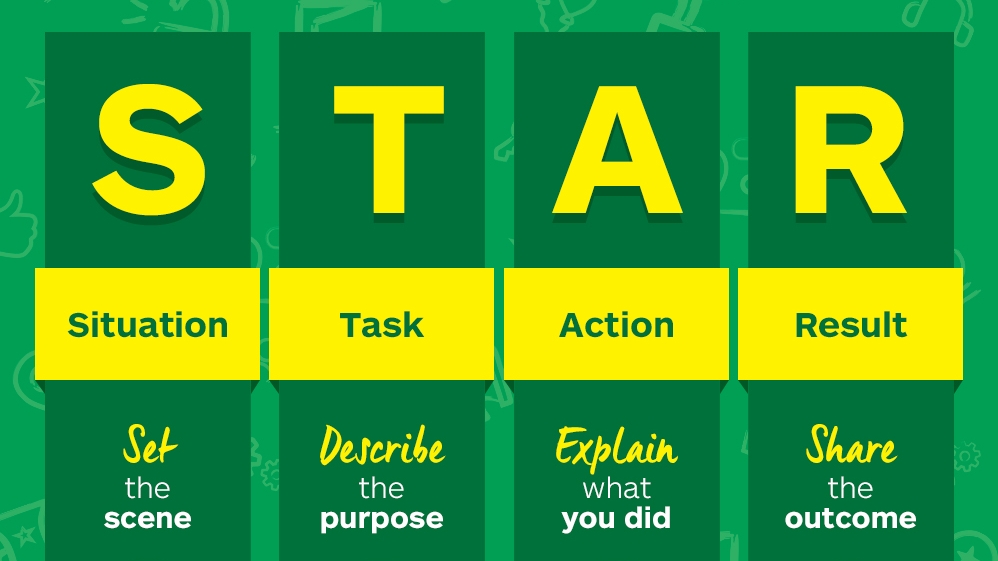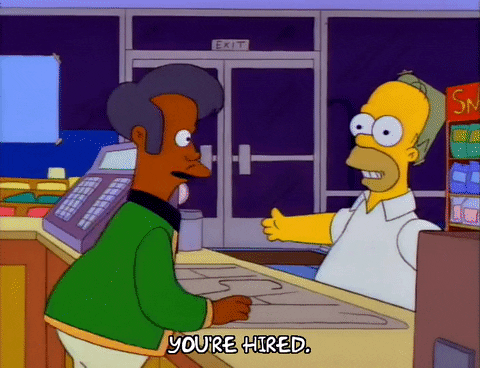
Applying for jobs is always exciting, there’s no doubt in that. But for every butterfly of excitement there is also an existential dread for one inevitable part of the process, the interview. Regardless of how badly I have ever wanted a job the knowledge that an interview is an unavoidable enemy that must be defeated has invariably filled me with nerves. So, with my excitement for undertaking my work placement module there has been a certain sense of nervousness sitting with me all year purely on the basis that a simulated job interview would be a part of it. In order to reflect on my experience, I will once again utilise Boud et al’s model of reflection as it aided me after my last blog through which “people recapture their experience, think about it, mull it over and evaluate it. It is this working with experience that is important in learning.” (Boud, 19)

Experience
Our simulated job interview consisted of finding a job you would want to apply for after university and then, in groups of four or five, simulate a job interview where one person is the interviewee, and the rest are the panel. Finding a job for this task was conveniently easy for me as there is an annually advertised trainee edit assistant position at Yellowmoon Post Production. This is a position I have known about and, as an aspiring editor, aspired for since I started university. So, despite my nerves, I acknowledged the positives of practicing for a job I will certainly apply for and began my preparation.

We were advised in our AEL3001 classes of the STAR technique for interviews, that being situation, task, action, result. Again, conveniently for me, I was familiar with the STAR technique from the interview I did for my current job in the Passport Office.

However, inconveniently, the interview for that job was nearly four years ago. Furthermore, the application and interview of that job was based around a set of four behaviours which you were guaranteed to be asked about, so all I had needed to do was create and revise my four answers. Again, inconveniently for me, Yellowmoon had no such comfort. It did provide five points of essential criteria, for example meticulous attention to detail or ability to work as part of a team. As a naïve move on my part, I then prepped five answers for these criteria in the STAR format and revised them until it was then time for the main event, the interview itself.
“How do you feel about attending a selection interview? Nervous? Excited? Worried you’ll say something stupid?”
(Gregory, 96)
Initially I was able to keep my body language under control and, however awkward, maintain strong eye contact with my panel classmates. The first couple of questions were as I had prepared for and gradually I started to grow more at ease until they asked me a question I had not prepared for.
“How does your hobby of music apply to this position?”
This threw me and I could feel my body language falter. I had not prepped for this. But I was able to take a deep breath and assess the answers I had prepped, one of which revolved around my use of Reaper for a sound editing module I had undertaken. I was able to rejig this answer in the STAR method by replacing my experience in that module with my experience learning Reaper as a hobby in my own time so I could record my own demos. Crisis averted, body language back under control.
That did not last.
“Tell us about Yellowmoon and why you want to work here.”
I couldn’t believe it. Such an obvious question in any interview and I had completely overlooked it. I had no research into the company past my surface level knowledge and had no reason to work there past the job being in editing. My hands were all over the place and my eyes were on the floor as I scrambled something together about Yellow Moon doing great work on Game Of Thrones.
And then my interview was over, my feedback sheet written and then I joined the panel. The panel shined a completely different light on the experience.
Reflection

“After the experience there occurs a processing phase: this is the area of reflection”
(Boud,18)
As stated by Roulin “interviews are associated with a number of emotional or cognitive reactions for applicants” and within these reactions there is much for me to reflect on. A strong place to start is my feedback which, surprisingly, was resoundingly positive.
“Provided full well rounded answers”
“Strong use of relevant experience”
They also highlighted the strength of my answer to the music question. Reading my feedback did provide me with clarity; interviews are not such an evil thing and, more importantly, I am more than capable of succeeding in them. However, reflecting on my experience my main emotion I could feel was anxiety. It appears my prior knowledge of the STAR method had left me naively overconfident with my preparation of five, somewhat rigid answers. The music question may have gone well but part of me knows that was luck that one of my answers happened to tell a similar tale.
Following anxiety the next strong emotion was irritation with myself. In all my prep and revision I missed out on such a simple aspect of doing basic research on the company itself. “While you may be thinking that the very fact you have chosen to study media at university indicates your enthusiasm for the subject, you still need to convey this enthusiasm. “(Gregory, 31), and here I faltered, I spent far too much time on my own experience and virtually none on my passion and aspiration to become an editor for the company. This was picked up on in my feedback as they noted my body language slipping around this question, which confirms my feeling of ill preparation and frustration in the moment.
However, being on the panel provided a different emotion. After my interview when I joined the panel and we were writing interview questions there was no sense of malice or wanting to catch the interviewee out. Instead, the questions were geared around what would bring the best out of them. Then, when conducting the interviews, when they appeared nervous or gave short answers, the panel would ask more to draw the answers out. There was empathy and intrigue surrounding each interview, I wanted to hear what each person would answer and I wanted it to be the best it could be. Then an epiphany hit me, this is what real interviewers feel. Roulin states that “if the organisation is a high-end nightclub, the interviewer is the bouncer deciding if the party seekers at the door correspond to the profile of clients that the club wants” (2) and I had always assumed that this a club I desperately wanted into which the bouncer wanted to bar me from. But I was wrong, the bouncer wants to let you in. The interviewer is not an enemy trying to catch you out, they want to be the person they hire. After all “it is an expensive business to interview candidates and employers don’t waste time on people they aren’t seriously considering.” (Gregory, 96).
Outcomes

McMillan states that “It is part of human nature to learn continually from experience, generally becoming more proficient and wiser in our responses to events” and my simulated interview experience has been no exception. Firstly, I need my preparation to be more thorough. Although the STAR method is a great way to answer questions, I need to have more answers ready to apply to the method. This was enable me to fit these answers into unexpected questions so that I am never lost for something to say which will both help me answer and keep me calm.
Secondly, within this preparation I need to focus not just on my experience but also on that of the company. I need to research into what their goals and content are and how my experience is an asset to that. The bulk of my anxiety and irritation which I reflected on stemmed from the fear and reality of being under-prepared and although I am generally a nervous person the most effective way to mitigate these feelings is simply to be more prepared. This will help keep my body language in check as the more confident I am in my answers the more I can stay relaxed and not break my composure.
Thirdly, from this experience, I will be able to better control my nerves. My feedback showed me that despite my feelings I can perform under interview pressure. Furthermore, my experience on the panel showed me that the interviewer is not someone to fear. Although the interview is an inevitable battle, they are not an adversary but are instead an ally, who want to see you succeed. They want you to be hired. Through my reflection I will be able to keep this knowledge with me and do my absolute best to impress these imposing allies.

To conclude, this interview has been of great benefit to me, not only because I have not had an interview in years but also as I have never had an interview for my desired industry. With everything I know now I am confident that my interview dread will be, for the first time, outweighed by the butterflies of excitement.
References
Bibliography
Boud, David, et al. Reflection: Turning Experience into Learning. Routledge, 1985.
Gregory, Georgina, et al. Careers in Media and Film: The Essential Guide. Sage Publications Limited, 2008.
McMillan, Kathleen and Jonathan Weyers. How to improve your critical thinking and reflective skills. Pearson Education UK, 2013.
Roulin, Nicolas. The Psychology of Job Interviews. 2nd edition. Routledge, 2022.
Images
Koetzle, Patrick. Try reflection photography to find unique perspectives. Adobe, no date on webpage, https://www.adobe.com/uk/creativecloud/photography/discover/reflection-photography.html, 06/03/2024.
Maxie, no surname mentioned. How Volunteering Can Help YOU Get Ahead! Student blogs, 20/06/2017, https://blogs.staffs.ac.uk/student-blogs/2017/06/20/how-volunteering-can-help-you-get-ahead/, 06/03/2024
No artist credited. How to Pass a Job Interview Successfully. HSE University, no date on webpage, https://gsb.hse.ru/en/careercentre/career/interview, 06/03/2024.
No artist credited. How to use the STAR Technique in Job Interviews. Enterprise Mobility, no date on webpage, https://careersblog.enterprise.com/how-to-use-the-star-technique-in-job-interviews/, 06/03/2024.
No artist credited. Yellowmoon Post. X, no date on webpage, https://twitter.com/YellowmoonPost/photo, 06/03/2024.
Way, Marian. Problems, Remedies, Outcomes. Clean Learning, 20/08/2007, https://cleanlearning.co.uk/blog/discuss/problems-remedies-outcomes, 06/03/2024.